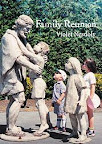I gave in to a great weakness again, a few weeks ago, and bought several old books from our church library sale table. To Live Again by Catherine Marshall was one of them. Although I’ve read several books by her - A Man Called Peter, Christy, Adventures in Prayer, to name three, I’d never seen this book. (Although my copy is the 1957 version, I see it was republished in 2002 by Chosen Books.)
The book begins:
"On the gray morning of January 25, 1949, my world caved in. At 8:15 my husband’s tired and damaged heart stopped beating..."
The author goes on to relate the events of that fateful day. The story is about how she kept from capsizing in the wake of her husband’s unexpected death (he was 46, their son only nine), came to edit a book of her husband’s sermons (Mr. Jones, Meet the Master), write his life story (A Man Called Peter) and become involved in the movie production of that book.
The main appeal of this book for me came in two areas. First, I think it would be a helpful book to read when dealing with the death of a loved one.
Mrs. Marshall makes no secret of how painful and devastating the death of her husband was. She manages to do this, however, without sounding whiny, pitiful or maudlin. I’m sure her insights would be reassuring and comforting to someone on such a journey.
I did question the orthodoxy of her conclusions in at least one department of this pilgrimage, however. As she tries to figure out what her relationship with her husband is now that he is dead, there were times I felt the author was on the verge of opening the door to accepting psychic phenomena. She uses a phrase from something her husband wrote in a letter ("I believe that those who have died are with us still in a different form and communicate with us in different ways...."), a fragment of the Apostle’s creed ("I believe in ... the communion of the saints..."), and stories from martyrs of the early Christian era to wring the assurance that the living are justified in trying to contact their dead loved ones. She sums up her conclusions:
"It made me wonder even more about that clause of the Creed whose meaning had been all but lost. On earth, human fellowship always involves the inner person, the spirit. Then what about after death? Either there is simply oblivion, or else the spirit that is the real person lives on in conscious awareness. If the latter, then the only possible communion across the barrier is through spirit. And for the Christian, the most potent vehicle of spirit – as well as the safest – is prayer." (Pages 211,212)
The inspirational story of how the book and movie projects came together is the second area this book had great appeal for me.
Choosing and editing the sermons contained in Mr. Jones, Meet the Master not only gave Catherine a job to do shortly after Peter’s death, but it also helped her in the healing process. When she embarked on her second project, writing Peter’s life story, she quickly realized what the focus of the book should be:
"I saw immediately what was wrong with the outline. The hero of the biography had to be God – not Peter Marshall. What I was to write was no ordinary Horatio Alger story of the successful immigrant. What Peter Marshall alone had done was not important; what God had done through him– a man with faults like the rest of us– was important. Jesus Christ would have to tower as the central figure of the book if the biography was to be anything more than a wife’s fond recollections. I saw that the life of no human being has lasting significance apart from his relationship to God." (P.133)
As a result of her taking this Jesus-honoring direction, it came as no surprise to me to read: "A series of events vindicated my faith that Someone Else’s hand was on the project and that His help was always available." (p.135)
She goes on to recount how time after time the right person would appear on the scene with exactly the information or help she needed, events would be set in motion or halted in a timely way, decisions made or reversed with no intervention on her part other than private prayer. That part of the story left me with the feeling that anything is possible when God initiates a project.
A minor irritant in this department was the reprinting of innumerable pieces of fan mail Catherine received in response to both books and the movie. A sampling would have been sufficient, but a whole chapter and then some? I
Altogether, though, the book was a worthwhile read. I came away from it with a sense that God has the power and creativity to turn even tragedy into triumph. He certainly did that for Catherine Marshall in the aftermath of her husband’s death.

0 comments:
Post a Comment